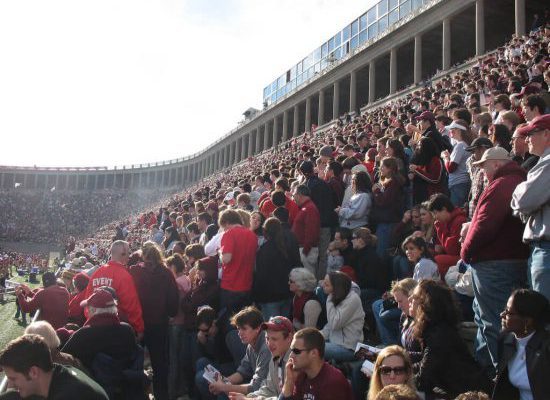29-29: A Confession and a Question
Now that we are about to move past the semicentennial of the Yale-Harvard game of 1968, maybe it is safe for me to emerge from the shadows and make a confession and pose a question.
First, the confession.

Like many of my classmates, I journeyed from New Haven to Cambridge on November 23, 1968. But while my car-mates were on their way to watch the game, I was not. The first semester of my freshman year, these same friends had induced me to attend my very first ever football game: Yale vs. Holy Cross. I remember nothing of the game itself; all I retain is the post-game spectacle of priests flashing ear-to-ear grins. That was also the last football game I have ever attended.
Rather, I was in Cambridge that day to improve my recent acquaintance with a remarkable (alas, now recently deceased) Radcliffe student, a brilliant, witty, and attractive Russian major. While the drama was playing out in Harvard Stadium, she and I were discussing Lermontov and Pushkin over tea in the common-room kitchen of Barnard Hall, Radcliffe Quadrangle.
As the time approached to return to the car, I impulsively suggested to my Cliffie friend that she come back to New Haven with me and spend Saturday night and Sunday in the architectural splendor of Morse Tower before catching a train back to Cambridge. To my surprised delight, she readily agreed and hurriedly packed a flight bag.
As we fought our way up Boylston (now JFK) Street amidst a crush of Yalies and Harvardians, we were puzzled by the peculiar mood suffusing the oncoming twilight under the livid clouds. While dejection was palpable enough, jubilation seemed oddly absent. We simply could not guess which side had won. My companion joked, “Maybe it was a tie!”
Now, the question.
When we located the car, my friends informed us that it was no joke. It had in fact been a tie. I laughed and said, “That’s wonderful! Both teams were undefeated going in—and they still are. What could be a better way to end the season?”
My friends glared at me in glum incomprehension.
So, after all these years, my question remains: What was it that I failed to grasp that historic day—and still fail to grasp a half-century later? If one undefeated team had won that day, the other team would have ended a triumphant season with a bitter loss. But as it happened, neither team lost. Perhaps some classmate can explain to me what was wrong with that.

Obviously, winning and losing are relative terms like happy and sad. When you are elated to have totally trounced your arch rival, driving their over-confident faces into the mud and loudly celebrating. And then in less than two minutes, due to a series of totally improbable events that couldn’t in this universe ever happen in that sequence or in that short a period of time, said totally trounced rival miraculously comes back from the dead and ties the game with a score, that by the mathematics of football scoring is near impossible, you have good reason to be as dejected as you would have been had you lost.
Imagine the priests who turned Jesus over to Pilate and celebrated all nightand probably for the next two days after they saw him die on a cross; imagine what they must have felt when word reached them that this arch rival of theirs, who they had finally and gloriously done away with, had risen from the dead.
Does that make the unforgettable agony of that day any clearer to you?
Richard Seltzer, Calhoun ’69
Imagine your Russian major friend telling you that she had invited another guy to join you for tea and discussions and that, in fact, he showed up and she showered him with attention. How would you have felt?
Fake news, you Putin,
You Cantab at heart.
You were at that Game–
I saw you depart!
Well, Yale was “supposed” to be better. Yale was widely expected to win. And Yale was winning easily until the crazy ending in which everyone, including (as Carm Cozza later asserted) the officials, got caught up in the momentum. On the other side, Harvard certainly treated it as a victory, and wasn’t shy about rubbing it in. I attended the postseason football banquet as a member of the Yale Band contingent. One of the speakers was the late author/sportsman (and Harvard grad) George Plimpton, who elicited a mixture laughs and groans with a remark along the lines of, “I haven’t seen this many Yale men in one place since I saw a lot of them folding their handkerchiefs.”
Inspite of the outcome of the 29-29 game, I fondly remembered walking out from the stadium and meeting a Harvard student running back asking “whether the game was over?”
I happily informed that it was and that he missed it.